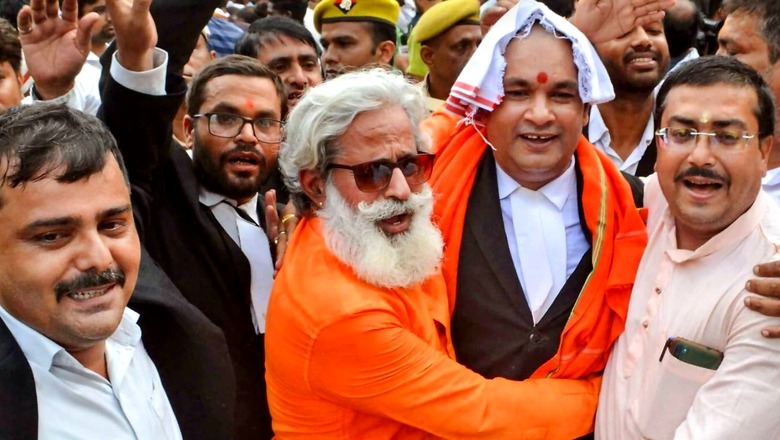
views
The Ayodhya case judgment of the Supreme Court has found a prominent mention in the court judgment on the Gyanvapi issue, with the court mentioning it while rejecting the contention that the suit of the Hindu side is barred by Section 4 of the Places of Worship (Special Provisions) Act, 1991.
The Hindu side had cited the M Siddiq Vs Mahant Suresh Das judgment of the SC (popularly known as Ayodhya Case) to lay their case that the destruction of the idol does not result in termination of the pious purpose and consequently the endowment. That judgment had said that even where the idol is destroyed or the presence of the idol is intermittent or entirely absent, the legal personality created by the endowment continues to subsist.
The Hindu side argued that the entire property in question vests in their deity “from the time immemorial” and existed there before August 15, 1947.
This may now open a pandora’s box for other such religious sites in India.
‘WORSHIPPER CAN PROTECT DIETY?s INTEREST’
The Hindu side said the Ayodhya judgment made it clear that the present suit by them is not barred by any provision of Places of Worship (Special Provisions) Act, 1991.
The Varanasi court seemed to agree with this as it mentioned the Ayodhya judgment to say in its order: “In our country, idols are routinely submerged in water as a matter of religious practice. It cannot be said that the pious purpose is also extinguished due to such submersion. The establishment of the image of the idol is the manner in which the pious purpose is fulfilled. The pious purpose may also be fulfilled where the presence of the idol is intermittent or there exists a temple absent an idol depending on the deed of dedication. In all such cases the pious purpose on which legal personality is conferred continues to subsist.”
#GyanvapiCase | #Hindu side's lawyer Vishnu Jain in an exclusive conversation with CNN-News18Advocate Harishankar Jain from the hindu side shares his views on #PlacesOfWorshipAct@anany_b with details | @GrihaAtul pic.twitter.com/LCUqVyzfZU
? News18 (@CNNnews18) September 12, 2022
The Hindu side also argued that it has been held in the Ayodhya case that a worshipper can institute a suit to protect the interest of the deity against a stranger if the trustee has been negligent in its duties ? in this case, it was the Board of Trustees constituted under the provisions of Shri Kashi Vishwanath Act.
The Hindu side argued that the Trustees had failed to perform their statutory duties regarding “proper Darshan, Pooja and performance of rituals of Maa Shringar Gauri, Lord Ganesh, Lord Hanuman and other visible and invisible deities within whole temple complex”.
‘IDOL IS REPRESENTATION OF THE SUPREME BEING’
The court referred to the Ayodhya judgment to say the idol is a representation of the Supreme Being and by possessing a physical form is identifiable. “In Hinduism, physical manifestations of the Supreme Being exist in the form of idols to allow worshippers to experience a shapeless being. Divinity in Hindu philosophy is seamless, universal and infinite. Divinity pervades every aspect of the universe. The attributes of divinity defy description and furnish the fundamental basis for not defining it with reference to boundaries physical or legal. For the reason that it is omnipresent it would be impossible to distinguish where one legal entity ends and the next begins,” the Varanasi court judgment has mentioned.
The Varanasi judgment says that so conceived “the Hindu idol is a legal person” and the property endowed to the pious purpose is owned by the idol as a legal person in an ideal sense.
“The reason why the court created such legal fiction was to provide a comprehensible legal framework to protect the properties dedicated to the pious purpose from external threats as well as internal maladministration. Where the pious purpose necessitated a public trust for the benefit of all devotees, conferring legal personality allowed courts to protect the pious purpose for the benefit of the devotees,” the judgment says.
Read all the Latest News India and Breaking News here



















Comments
0 comment